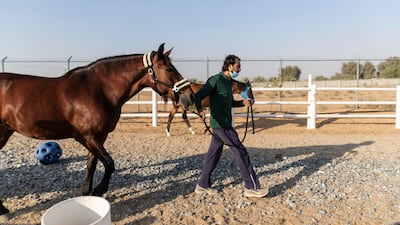Two Emirati sisters who are wild about horses have opened a new home for the animals in the UAE that replicates their life in the wild.
Jamila Ibrahim set up Malath Paddock Paradise with her sister, Maryam, after hearing about an alternative way to stable horses.
The centre in Umm Al Quwain is unlike traditional stables, which keep horses in small rooms when they are not being ridden.
The horses at Malath live outside around the clock, and are brought inside during the day only once the temperature rises.
During the hotter months they remain outside when possible, which is sometimes overnight only.
Malath is believed to be only the second stables of its kind in the UAE.
The concept is based on the work of Jaime Jackson, an expert on horses in the US. After studying wild mustangs' behaviour, Mr Jackson discovered that the animals keep to familiar routes or tracks.
“He followed wild horses for months and then he noticed that no matter how big the area is, or how much space they have, the horses constantly create a little track that they go as a herd to find graze or find somewhere safe to sleep,” says Jamila, 28.
“They continue on and on the same track until something happens, and they move away and create another track.”

She heard about the concept after competing against riders who kept their horses in a paddock paradise.
“When I first came across this, I jumped. All I had in my head was if horses are jumping, you have to protect their feet,” she says.
“The lady I was talking to said all of the horses competing are barefoot.
“But in order to have a horse barefoot, you don’t just take off the shoes and keep them in a stable. They have to have the correct diet and movement.”
So, they decided to buy land to create their own track system. "You do not even need much space to do it," Jamila says.
“Instead of having a big field, you have to make it like a square and a square.
“So it is a track instead of just open space. This way it imitates natural life where you have hay across the track and one spot that has water.
“We have different terrains for them, for their hooves to walk on. There are uphills and downhills. We try to give them as much of a natural life as possible.”
When most people think of horses they picture a green feed. But they traditionally live in dry areas or mountains, she says.
Malath is working on greenery and does have some trees, but is mainly a desert-like environment. It has all the same facilities as a regular stable, such as outdoor and indoor AC-controlled barns.
But they are not used in the same way as other centres, and mainly only if it is hot.
Its horses — there are currently 28, with room for 40 in total — all live together in a herd.
Jamila says when people first hear of a paddock paradise they assume it is for retired horses, which they do accept.
But even competition-level horses can and do benefit from a paddock paradise lifestyle.
“If anything it makes them better. They are constantly moving and they are warmed up already before a ride,” she says.

The only other centre she knows of like it is in Dubai. But it is constantly full and has a waiting list. She would, however, welcome more competition.
“This is more popular abroad and hopefully we are catching up,” Jamila says.
“If other stables open this up, I would love it. I would love to see more people do this. Our priority is to raise awareness.”











